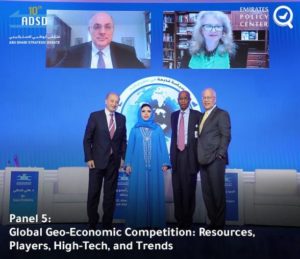 X th Abu Dhabi Strategic Debate
X th Abu Dhabi Strategic Debate
13 – 14 November 2023.
Abu Dhabi Center, UAE.
Global Geo-economics Competition: Resources, Players, High Tech and Trends.
Ahmedou Ould Abdallah, President centre4s.org, former UN Under Secretary – general.
Ladies and gentlemen,
First of all, I’m pleased to express my thanks and indeed my congratulations to the organizers of this Xth Forum as well as to the talented and forwards looking Leadership of the Abu Dhabi Center.
Carl von Clawsewitz wrote ‘’that war is the continuation of politics by others means.’’
Today, geoeconomics is that continuation of politics. Over centuries, global economic competition in all fields –agriculture, mining, trade, transportation, services – has been intrinsically part of inter States relations. And indeed, it still continues including in the outer space. However, for the last two decades, trade competition has taken unprecedented dimensions. To achieve geopolitical goals, increasingly, states mobilize larger financial, diplomatic and military resources and other formal and informal tools of influence. The pursuit of effective implementations of strategic objectives dominates international relations. Geo-economics is that policy.
Political and economics assets and other leverages, including emerging trends in high tech sectors, helps to conquer important present and future markets. To comfort national interests by seeking these markets, major countries and a few smart smaller states, support their national private companies. Thus they shape the global geoeconomics.
With these challenges, geoeconomics focusses on interactions between states. Competing in the global economy and technology many high tech sectors, international key players increasingly impact on all world regions.
- Global geoeconomy competition impact on regions and players.
Geoeconomics addresses the interrelations of economics, geography and politics in the « infinite cone » rising from the center of the earth to outer space. That includes economic analyses of Planet Earth resources and implies vast considerations. There is the international level that includes organizations, economic relations as well as bilateral and regional agreements. It works through legislations regulating finance and trade. These economic instruments help promote and defend national interests and produce geopolitical results. They indeed have effects on other nations’ economic activities and geopolitical goals.
That geoeconomics – policy, integration, and transaction – is interlinked with national policies. Policies ranging from tax incentives for particular industries to anti-money laundering laws or sanctions on specific cross-border financial transactions. Geo-economics doesn’t necessarily lead to armed conflicts.
The importance of economic power or geo-economics is surpassing military power and traditional geopolitics. Thus, the saying: ‘’America must beat its swords not into plowshares but into microchips.’’ Smart states, in strategic position, should control access of key information.
Countries should include critical geo-economic evolution in their policies. Business plans, with governments funding – loans or credit – are developed to encourage and facilitate private investments in regional major infrastructures projects.
- Key players shaping the global geoeconomics.
Today, States are geographically, economically and diplomatically the central players on earth, seas, space and the out space. Thanks to technological superiority, competition is now everywhere and that is the domain of geoeconomics. Geoeconomics helps to conquer economically and commercially more territories. Not by arms but politically with investments, trade and innovations in all fields. State-sponsored research and development has become the most important tool to peacefully lead far away territories.
These infrastructures are essential to internal peace and real sovereignty. In that context, the USA through Eximbank loans and China, through its Belt and Road Initiative, are key world geo-economic powers. Successful Dubai Port Authority, an Emirati multinational logistics company, is an example of a smaller country geoeconomics power.
In addition, providing grants or loan with low interest rate helps to finance research, build infrastructures and promote exports to conquer close and far away markets. Competition over exportations is now a major tool shaping the global economy. Developing countries, not financially able to build their vital infrastructures, for diversified energy and transportation, are a major field for competition.
- Competition or a new cold war in technology fields.
More than in the past, today technological superiority is essential to self-independence and in states competitions. States engage in geo-economic rivalry in assisting their own private sector by funding and offering guaranties to investments in high-risk research and by initiating international markets conquest. They do it also in opposing, peacefully, foreign business interests. Indeed, strong private sector asset owners – pension funds – the “age of geoeconomics assets” – have an increasingly important part in foreign investments.
Responsible governments cannot ignore these major geoeconomics developments and they often solicit investors to support national geoeconomics plans. Indeed, programs backed by large funding mechanisms do encourage private investments for example in regional infrastructure assets.
- Possible trends for high tech sectors.
In addition to legislations restricting or penalizing the use of strategic information by non-nationals, governments back their private sector by subsidizing costly research and development. Thus they get an advantage in external markets and also profitable shares. For the same objectives, they often impose taxes and quotas on foreign products, reinforce legislations on imports, subsidize exportations, encourage national technology programs and gather economic and technical intelligence.
These proactive policies are important geo-economics policies. In addition, state-sponsored investments, in research and development, remains most decisive policy tools. The overall goal is to conquer industries of the future through successful technological lead.
Often governments support commercial production by appropriate forms of subsidies. Indeed, the main geo-economic arm remains financial backing. If states subventions are inadequate to help national exporters to win over foreign competitors, governments can subsidize loans to exporters through institutions guarantying loans for overseas activities.
In fine. In today competitive international environment, economy is moving worldwide deep and fast. That is an issue to states, populations and businesses while bringing prosperity, helping to obtain powerful external influence including outer space expansion. The objective is to gain power and control upon other states and firms.
That is our geoeconomy international environment.
Ahmedou Ould Abdallah, President centre4s.org, former UN Under Secretary – general.
